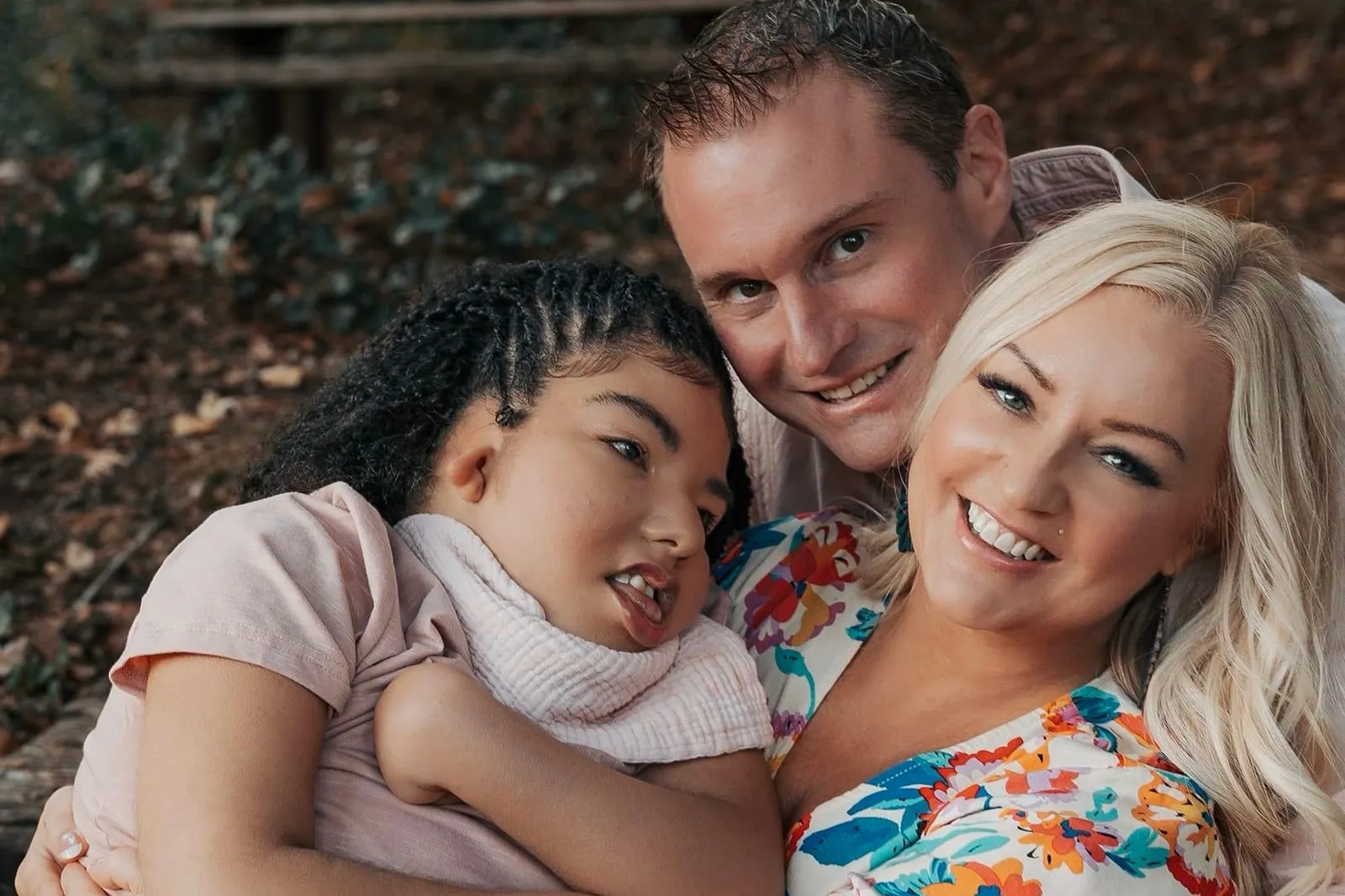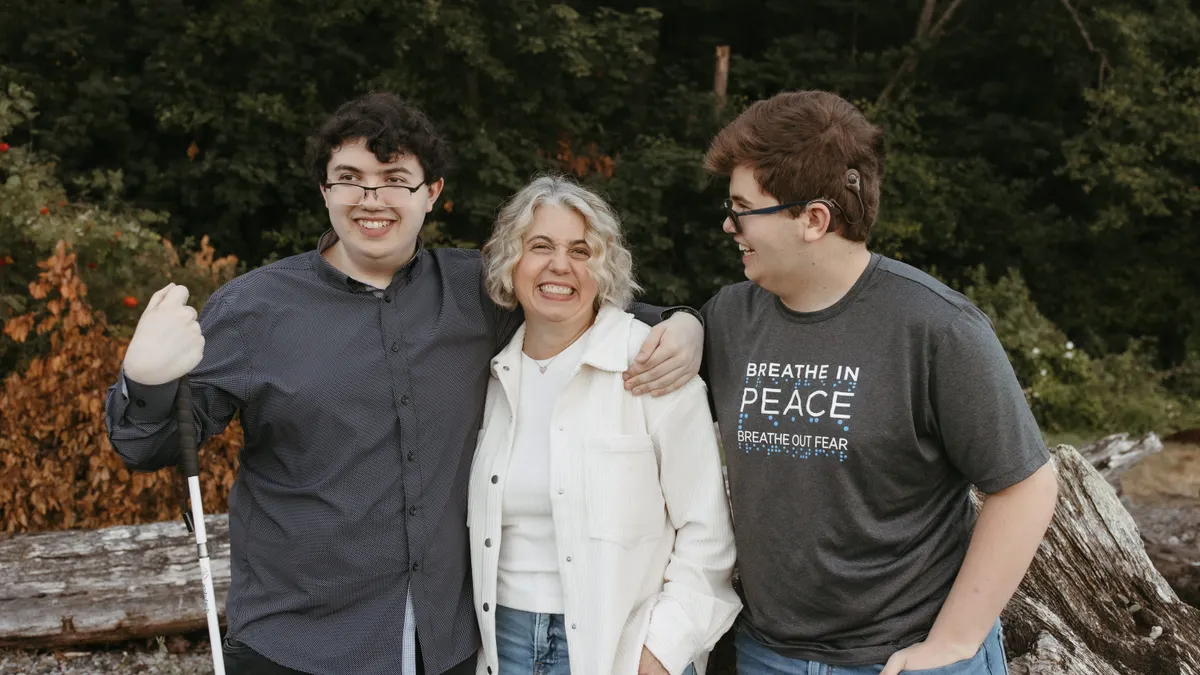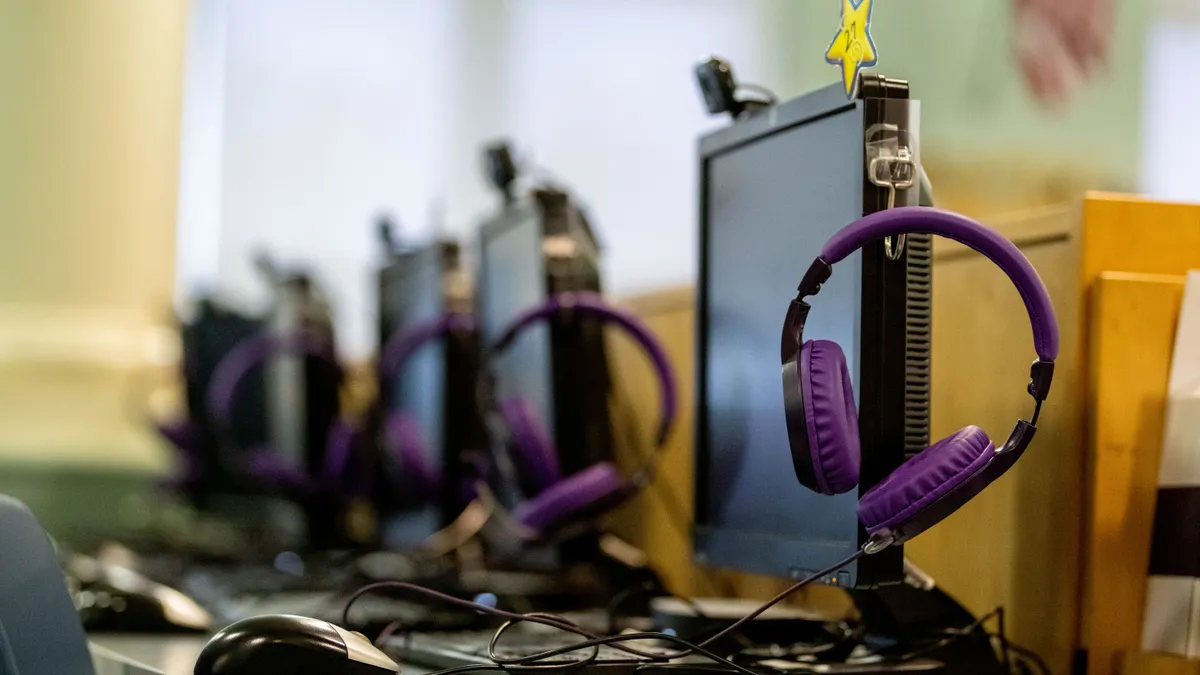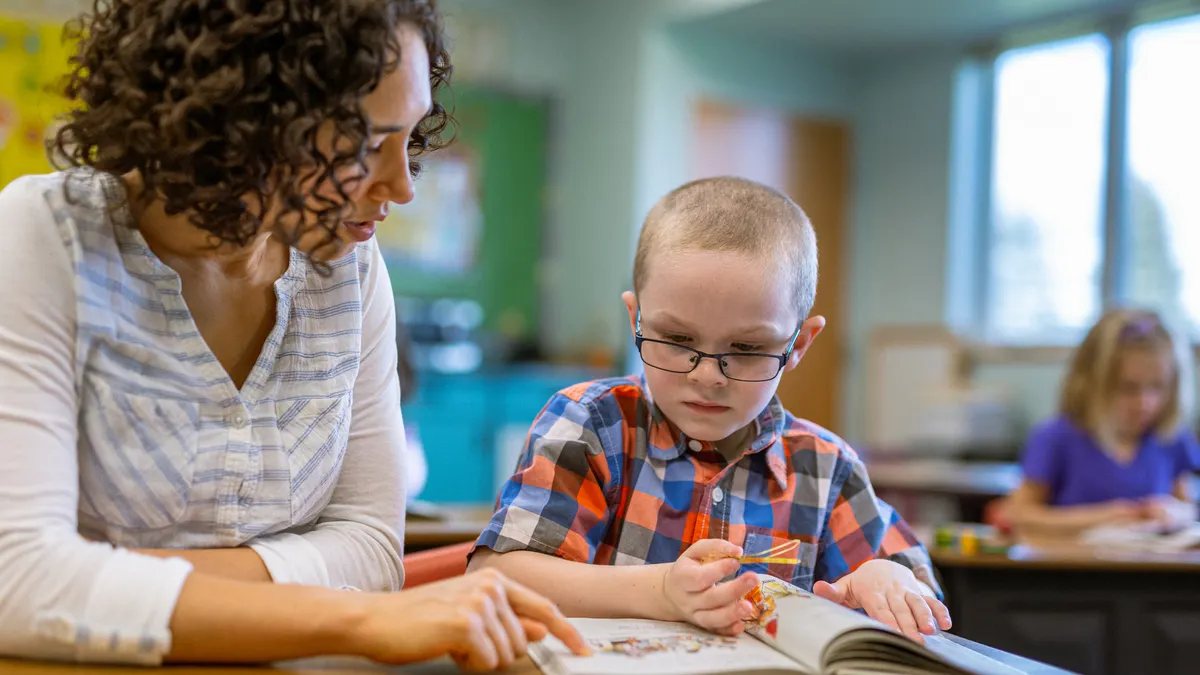Families, educators and advocates of children and youth who are both blind and deaf are scrambling to reclaim abruptly canceled federal funding that they say is a "lifeline" for students' educational and developmental progress.
A notice of noncontinuation from the U.S. Department of Education recently went to four deafblind projects in Washington, Oregon, Wisconsin and a consortium of New England states including Connecticut, Maine, Massachusetts, New Hampshire and Vermont. Advocates say the notice was sent Sept. 5, although a letter reviewed by K-12 Dive is dated Aug. 27.
The noncontinuation notice to Oregon's deafblind project fiscal agent, for example, said continuing the project "would be in conflict with agency policy and priorities, and so is not in the best interest of the Federal Government."
The notice quoted from the project’s 2023 grant application, which said the grant's partners "are committed to working to improve strategies, interventions, processes to address inequities, racism, bias, and system marginalization of culturally, linguistically, or dis/ability groups."
Combined, the four projects' grants were to total about $1 million for the coming fiscal year, according to figures provided by deafblind advocates. The grants in those states serve about 1,365 children and their families, advocates said.
The projects are going into the third year of a five-year grant. The federal funding supports deafblind youth who attend public, private, and charter schools or are homeschooled. It is used for teacher training and professional development, family resources and training, educational materials and technology, and other activities.
The Education Department's notice to the fiscal agent of Oregon’s deafblind project gave the grant manager seven days to request reconsideration.
The Trump administration has been eliminating programs promoting diversity, equity and inclusion at the K-12 and higher education levels — and across the government. As such, the disability rights community has been concerned that those moves would also target efforts that support students and people with disabilities.
Moreover, education programs have been singled out as the Education Department under President Donald Trump has pushed to reduce federal red tape and bureaucracy by giving states more control over how they spend federal funds.

Deafblindness and the DEI debate
According to the National Center on DeafBlindness, a national child count conducted Dec. 1, 2023, showed 10,692 children and young adults from birth to age 26 were eligible for state deafblind project services.
Deafblindness is a low-incidence disability, meaning it's not considered common. The combination of hearing and vision impairments "causes such severe communication and other developmental and educational needs that students cannot be accommodated in special education programs solely for children with deafness or children with blindness," according to the Individuals with Disabilities Education Act.
Deafblindness is one of the disability categories that qualify for IDEA services. The recent notices of noncontinuation of the IDEA Part D grants to state deafblind projects do not impact IDEA Part B and Part C services for developmental and educational supports to infants, toddlers, children and young adults with disabilities.
Most states have their own deafblind projects that receive federal funding through IDEA, although some states partner in a multistate consortium, according to the National Center on DeafBlindness, a federally funded technical assistance center.
"Make no mistake, losing these funds will directly impact our ability to serve some of our most vulnerable kids."

Jill Underly
Wisconsin state superintendent
The Oregon DeafBlind Project had expected to receive $133,543 for the new fiscal year starting Oct. 1. The state serves about 114 children and youth with deafblindness.
Project Director Lisa McConachie said the noncontinuance is "nonsensical," especially since an annual report she submitted earlier this year had no mention of DEI. She said in 2023, at the time of the project's application under the Biden administration, grantees were required to add language about DEI as part of the application.
McConachie is employed by Portland Public Schools, which is the fiscal agent for the grant. She said on Tuesday that she was planning to file an appeal for reconsideration to reinstate the grant.
"We're just kind of stuck for a minute," McConachie said.
Although the project is funded through September, she said she worries about what could happen to children if the grant doesn't continue. "To stop support and services right during school is just so disruptive. It's time that will be lost and never recovered."
Portland Public Schools only became the state's fiscal grant manager for the deafblind project in the last two years, even though the grant has been ongoing for decades. In that time, the school system and its partners have been building connections and developing more educator, student and family supports, McConachie said.
"We've made all these connections and started to really move the dial for folks, and now we're going to be stopped," she said.
In Wisconsin, state Superintendent Jill Underly blasted the grant termination.
"Make no mistake, losing these funds will directly impact our ability to serve some of our most vulnerable kids," Underly said in a Tuesday statement. "Wisconsin had planned work with these funds that includes direct support for deafblind learners and their families and efforts to recruit and retain new special education teachers. We are asking for a reconsideration to protect these valuable projects."
Underly said the state's five-year grant totals more than $550,000 and helps serve 170 children and youth from birth through age 21.
In a statement to K-12 Dive, Savannah Newhouse, U.S. Education Department press secretary, said the department re-awarded over 500 IDEA Part D grants and did not continue fewer than 35 grants that do not align with the Trump administration's priorities.
Examples from the applications for grants that weren't continued, according to Newhouse, include:
- An early childhood technical assistance center that indicated its framework must “address the systemic racism that permeates all aspects of society,” to be achieved by “enhancing equity content within early childhood preparation programs.”
- A school for the blind that indicated it “must embed the values of diversity, equity and inclusion in all aspects of our work.”
- Embedding of ‘cultural humility’ as a significant aspect of all training provided to federally funded agencies supporting adults with disabilities.
"Many of these use overt race preferences or perpetuate divisive concepts and stereotypes, which no student should be exposed to," Newhouse said. "The non-continued grant funds are not being cut; they are being re-invested immediately into high quality programs that better serve special needs students.”

Educational and family supports
Parent Candice Elliott said connecting with the close network of deafblind families, educators and experts in Oregon was "life-changing" when she adopted her daughter Serenity seven years ago. Serenity, now 12, has deafblindness and other medical challenges. She was also the only deafblind student in her school district.
"Our deafblind kids have a lot of problems, and you just don't meet other people who have issues like this," Elliott said. She said her family benefited from experts who helped her communicate with her daughter and also connected her with other families in the same situation. Those parents lean on each other for expertise and emotional support, she said.
Now, Elliott is the one mentoring new families. She was working with others to organize an annual family weekend in October that would bring families from across the state together to hear from national experts, learn about high school transition services, and gain parent-to-parent advice and support.
Because the funding is ending, the project canceled the parent weekend. However, Elliott said, parents are organizing one on their own.
"What's really important is that we learn," Elliott said about the family weekend. "We have an education we get. We learn about how to support our kids. We learn about just how to help each other."
Audra Lydon lives in rural Dallas, Oregon. She was a police and fire dispatcher and a single mother when she brought her daughter, Aingelise, home from the hospital 20 years ago. In addition to being deafblind, Aingelise is quadriplegic and has multiple, complex medical needs.
"I had no experience, really, with anything related to either her medical needs or her communication needs, and specifically the deafblindness," Lydon said.
After connecting with the state's deafblind project, she learned strategies for communicating with Aingelise and what supports work best for her daughter. The project also helped her connect with other families who could understand and empathize with the joy and challenges of raising Aingelise.
Lydon said she worries that the sudden stop to funding will cause Aingelise's teacher to move away. Deafblind teachers are highly specialized to work with students with deafblindness who require supports in communication, access and literacy.
The loss of funding will harm the development of many children, Lydon said. "You can't just pull services for two years from kids. And I think what people also don't understand is developmentally, if kids lose out for two years during a really important developmental stage, recouping that for any child is difficult," but would be especially challenging for students with deafblindness, she said.
Lydon added, "Pulling services without notice or plan is entirely unethical and frankly speaks to the deep lack of understanding of the deafblind community."
"The non-continued grant funds are not being cut; they are being re-invested immediately into high quality programs that better serve special needs students.”

Savannah Newhouse
U.S. Education Department press secretary
In Washington state, parent Lanya Elsa said the IDEA Part D grant has been vital, because children with deafblindness have complex and individualized needs.
"There's just no way for a school district to have the qualified personnel and knowledge needed for something that's so rare, because they may only have one child in that district" with deafblindness, she said.
Elsa, parent to two sons ages 26 and 17 with deafblindness, is a special education researcher and former director of the Idaho Project for Children and Youth with Deaf-Blindness. Because of the supports her sons and her family received, she said, her older son, Conner, is employed at a major company, and her younger son, Dalton, is a high school senior preparing for college.
"I look at my kids and what they've been able to accomplish, " said Elsa, adding that she worries about families newly adjusting to a deafblindness diagnosis. "What if these families don't have the same opportunities that our family had? I can't even imagine, because we have nothing else.
"This is a lifeline for many families.”







 Dive Awards
Dive Awards















